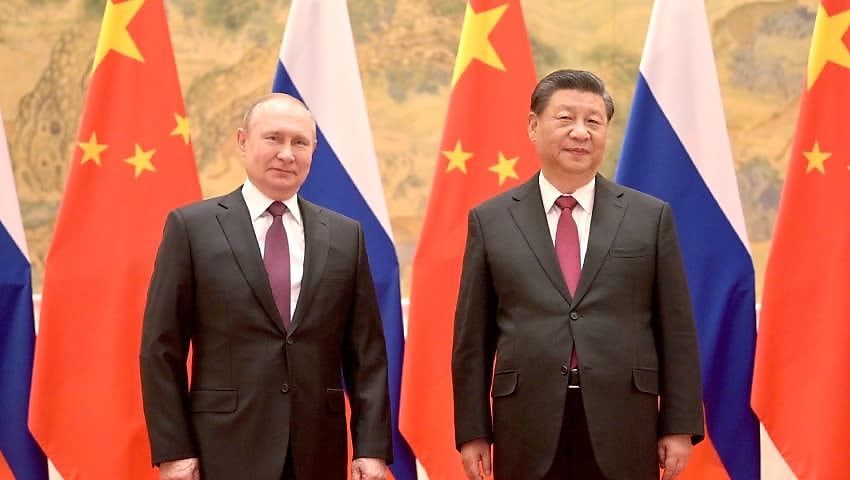Could a more aggressive US-led push to thwart the Kremlin’s ambitions in eastern Europe prompt Beijing to reconsider its geostrategic agenda?
To continue reading the rest of this article, please log in.
Create free account to get unlimited news articles and more!
In early February, Chinese President Xi Jinping hosted Russian President Vladimir Putin in Beijing as part of an effort to further strengthen bilateral relations.
The pair signed a “no limits” partnership, releasing a statement, which among other things, affirmed joint opposition to NATO expansion in eastern Europe.
Just weeks later, President Putin launched a full-scale invasion of Ukraine, prompting some observers to presume Chinese consent and support for the move.
The Sino-Russian pact has since led to depending economic ties between the nations, with Beijing agreeing to increase imports of Russian energy for a cut price.
This mutually beneficial agreement has softened the blow of Western sanctions against Russia in response to its ongoing assault on Ukraine.
In return, China has reduced its dependence on Western-backed energy suppliers like Saudi Arabia.
Russia has also ramped up imports of Chinese manufactured goods and leveraged the CCP-led regime’s financial networks to keep its economy afloat.
Given this arrangement between authoritarian regimes is undermining existing deterrence mechanisms, is it time for the West to turn up the heat?
According to Victoria Coates, senior research fellow at the Margaret Thatcher Center for Freedom, and Marshall Billingslea, senior fellow at the Hudson Institute, it is time for the US and its key partners to consider a new approach.
“Fearing to escalate the conflict, the Biden administration has reluctantly focused on limited economic sanctions, export controls, and military aid,” Coates and Billingslea write in a piece originally published by The National Review.
“Perhaps surprised by the strong initial response, led by the United Kingdom and the EU, Putin might have been concerned with Russia’s economy in March, but by April it was clear that Biden would not follow up with truly crushing measures.”
Coates and Billingslea argue the West should break the Sino-Russian alliance by imposing “crushing” sanctions on Russia, which along with curtailing Moscow, would strike fear into President Xi’s China.
These new sanctions, they note, could include tightening restrictions on Russian banks, which still retain some level of operational freedom.
“Russia is a major exporter of raw commodities, including oil and gas, metals, minerals, and timber. Russian banks, and its central bank, are essential to facilitating cross-border sales of these goods,” Coates and Billingslea observe.
“Moreover, they do this in dollars (or euros), since the ruble is a worthless currency outside of Russia.
“For that, they have to work with other non-Russian banks.”
Accordingly, Coates and Billingslea advocate US sanctioning of all Russian banks under Executive Order 14024, placing “secondary sanctions” on those transacting with the targeted Russian entity.
“President Biden hasn’t allowed his Treasury to do this. Not only are a number of Russian banks not sanctioned, but those that are aren’t covered by secondary measures,” Coates and Billingslea add.
They claim the US Treasury has “undercut” its own sanctions through the General License (G.L.) provision, which exempts all energy trade with Russia from any sanctions until December.
Coates and Billingslea call on Washington to repeal G.L. 8C to restrict all engagement with Russian banks.
“The chilling effect on Russia’s economy would be immediate and massive,” Coates and Billingslea write.
“The solvency of the Russian financial system would be in jeopardy, the ruble would take a nosedive, and the central bank would have to choose between funding Russian genocide in Ukraine and spending its hard currency reserves on saving the collapsing economy.”
Further, the analysts suggest the Treasury and State Departments, as well as the National Security Council staff extend warnings to China, India, and other regimes propping up the Kremlin.
“We will not tolerate continued bankrolling of the Russian war machine. Regardless of the predictable denunciations from Chinese officials, Chinese commercial interests would prevail,” Coates and Billingslea write.
“Their banks and companies need access to the US financial system and our markets far more than they need cheap, dirty, Russian oil.”
This bolder response to Russian aggression, they contend, would not only curtail Moscow, but would also deter China from launching its own military campaigns, particularly against Taiwan.
“Such a plan would have the added benefit of demonstrating to Xi that the US is willing to use hard economic power when circumstances call for it,” Coates and Billingslea state.
“Of course, what we are proposing with Russia pales by comparison with what would be required to enact a similar policy against China.
“But both of us had the honour to work for former secretary of defense Donald Rumsfeld, and he included in his famous Rules the Chinese proverb “Sometimes you have to kill a chicken to frighten the monkeys.”
Coates and Billingslea conclude: “As difficult and risky as it would be to take such drastic steps against Putin, such a strategy is emerging as the only viable path short of direct military intervention to end the war in Ukraine on terms favourable to both Washington and Kyiv — and, hopefully, to avoid an even more dangerous escalation in the Pacific in the process.”
Get involved with the discussion and let us know your thoughts on Australia’s future role and position in the Indo-Pacific region and what you would like to see from Australia's political leaders in terms of partisan and bipartisan agenda setting in the comments section below, or get in touch with

 Login
Login







